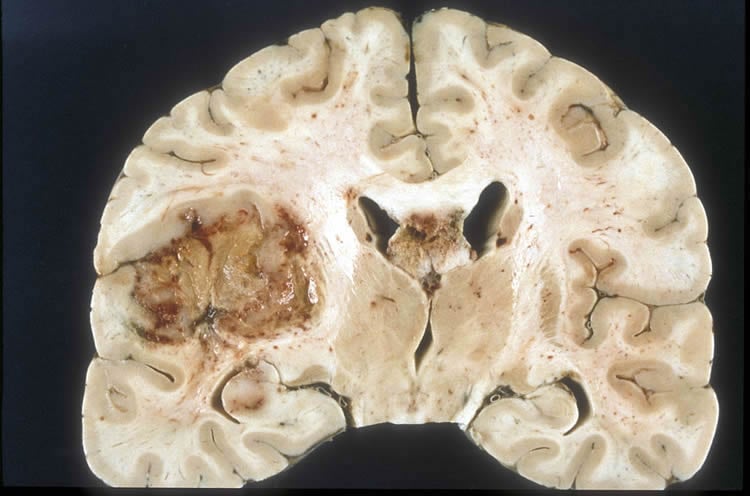Summary: Researchers detail the use of a drug that may help block the way glioblastoma brain cancer cells respond to fluid flow. The finding could lead to stopping glioblastoma from spreading.
Source: Virginia Tech.
The tissues in our bodies largely are made of fluid. It moves around cells and is essential to normal body function.
But in some cases, this fluid may be doing more harm than good.
In people who have glioblastoma, the deadliest form of brain cancer, this fluid has a much higher pressure, causing it to move fast and forcing cancer cells to spread. And a common cancer therapy, which inserts a drug directly into the tumor with a catheter, can make this fluid move even faster.
A team of researchers at Virginia Tech, led by Jennifer Munson, an assistant professor in the Department of Biomedical Engineering and Mechanics in the College of Engineering, may have found a solution to stopping this inevitable cancer cell spread.
In an article published on Nov. 19 in Scientific Reports, Chase Cornelison, lead author and a postdoctoral researcher at Virginia Tech, details the use of a drug that Munson’s team found can block the way cancer cells respond to fluid flow. This work is part of a Munson-led five-year research grant project across multiple universities, examining the role of interstitial fluid flow in the spread of glioma cells. Interstitial fluid is the fluid that surrounds cells in the body.
In labs, Cornelison and others on Munson’s team used mice with glioblastoma to test how a particular approach to delivering cancer treatment, called convection enhanced delivery, caused glioma cells to invade the rest of the brain. To block the fluid’s rapid movement and the spread of cancer cells, they tested a drug called AMD3100. The drug, which already has been used in clinics, appeared to be a game changer, Cornelison said.
The majority of this research happened at the University of Virginia, where Munson previously worked before she came to Virginia Tech in 2017.
This finding could lead to stopping glioblastoma from spreading, Cornelison said.

“I am hopeful that since the drug that we used to block flow stimulation is currently used in patients that maybe clinicians, when they do consider using convection enhanced delivery, will combine that with this drug,” he said.
Munson has been studying glioblastoma for more than 10 years, with a more recent focus on the role of interstitial fluid flow on cancer cells and the brain.
“It [glioblastoma] is so deadly, and there hasn’t been a shift in treatment response in decades. Something needs to change,” she said. “With my expertise and looking at fluid flow, maybe there’s an answer there that we haven’t seen.”
Raising awareness of interstitial fluid flow throughout the body is Munson’s aim in her research.
“This is a force that isn’t accounted for much in brain tissues,” she said. “My goal is to have more people thinking about this force and that it can actually have effects on cells that we don’t intend.”
Source: Lindsey Haugh – Virginia Tech
Publisher: Organized by NeuroscienceNews.com.
Image Source: NeuroscienceNews.com image is in the public domain.
Original Research: Open access research for “Convective forces increase CXCR4-dependent glioblastoma cell invasion in GL261 murine model” by R. Chase Cornelison, Caroline E. Brennan, Kathryn M. Kingsmore & Jennifer M. Munson in Scientific Reports. Published November 19 2019.
doi:10.1038/s41380-018-0282-3
[cbtabs][cbtab title=”MLA”]Virginia Tech”Drug Discovery Could Halt Brain Cancer Spread.” NeuroscienceNews. NeuroscienceNews, 19 November 2019.
<https://neurosciencenews.com/brain-cancer-neurophrmacology-10220/>.[/cbtab][cbtab title=”APA”]Virginia Tech(2019, November 19). Drug Discovery Could Halt Brain Cancer Spread. NeuroscienceNews. Retrieved November 19, 2019 from https://neurosciencenews.com/brain-cancer-neurophrmacology-10220/[/cbtab][cbtab title=”Chicago”]Virginia Tech”Drug Discovery Could Halt Brain Cancer Spread.” https://neurosciencenews.com/brain-cancer-neurophrmacology-10220/ (accessed November 19, 2019).[/cbtab][/cbtabs]
Abstract
Convective forces increase CXCR4-dependent glioblastoma cell invasion in GL261 murine model
Glioblastoma is the most common and malignant form of brain cancer. Its invasive nature limits treatment efficacy and promotes inevitable recurrence. Previous in vitro studies showed that interstitial fluid flow, a factor characteristically increased in cancer, increases glioma cell invasion through CXCR4-CXCL12 signaling. It is currently unknown if these effects translate in vivo. We used the therapeutic technique of convection enhanced delivery (CED) to test if convective flow alters glioma invasion in a syngeneic GL261 mouse model of glioblastoma. The GL261 cell line was flow responsive in vitro, dependent upon CXCR4 and CXCL12. Additionally, transplanting GL261 intracranially increased the populations of CXCR4+ and double positive cells versus 3D culture. We showed that inducing convective flow within implanted tumors indeed increased invasion over untreated controls, and administering the CXCR4 antagonist AMD3100 (5 mg/kg) effectively eliminated this response. These data confirm that glioma invasion is stimulated by convective flow in vivo and depends on CXCR4 signaling. We also showed that expression of CXCR4 and CXCL12 is increased in patients having received standard therapy, when CED might be elected. Hence, targeting flow-stimulated invasion may prove beneficial as a second line of therapy, particularly in patients chosen to receive treatment by convection enhanced delivery.






